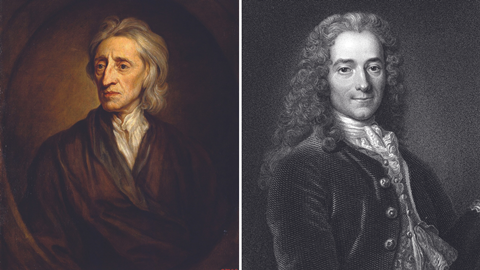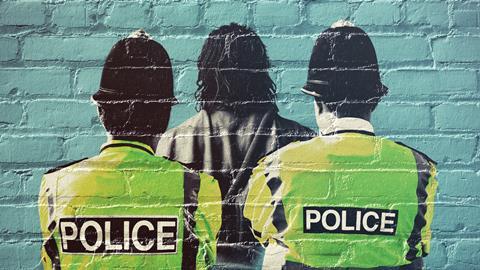As a survey suggests a quarter of young people would ban the Bible if it contained hate speech, and Christians are wrongfully arrested while street preaching, Heather Tomlinson investigates: Is our freedom of speech being eroded?
Jesus didn’t have a right to freedom of speech. “I am,” he said to the Sanhedrin (Mark 14:62) and was promptly condemned for his words. In most times and places throughout human history, it has been extremely dangerous to publicly disagree with religious or political powers. Yet in Western countries over the past 500 years, an unusual principle has emerged: the right to freedom of speech, protected by law.
Today, free speech is often considered a Christian value. The countries who have the greatest regard for free expression, as defined by the Global State of Democracy Indices, almost all have a Christian past. Nonetheless, some of the most significant Christian pressure groups in the UK – including Christian Concern, the Christian Institute and CARE – fear that this treasured freedom is now under threat. They cite believers who have lost their jobs, been banned from speaking at events or even arrested, often after articulating a Christian view of sexual ethics.
The 18th-century French writer Voltaire famously said: “I wholly disagree with what you say and will contend to the death for your right to say it.” Simon Calvert, deputy director at The Christian Institute makes a similar point: “Most Christians in the UK understand that protecting gospel freedom means we also have to protect freedom of speech in the public square for people we disagree with,” he explains. “As far as the law is concerned, we have to defend a broad canopy of freedom of speech, under which we can say the things we want to say, and others can say what they want to say.”
Freedom only to speak inoffensively is not worth having
Yet in wider society, there seems to be declining interest in this long-cherished principle. A recent survey by Whitestone Insights found that nearly a quarter of young people would consider banning the Bible if they thought it contained “hate speech”. According to a survey carried out by the King’s College London Policy Institute in 2022, more people feel the need to watch what they say compared to just two years ago.
Christians have long felt this reality. In 2015, Felix Ngole was thrown off his social work degree at the Univeristy of Sheffield for saying that homosexuality is a sin on social media. Following a lengthy court battle, the decision was eventually ruled unlawful. In 2017, the University of Oxford’s Balliol College banned the Christian Union from their freshers’ fair to preserve a “safe and secular space”, before later U-turning on their decision. In 2020, an attempt was made to no-platform Fiona Bruce MP as she spoke at a meeting of Oxford students on her campaign to outlaw sex-selective abortion. She cited the incident when she joined other MPs in calling for a public inquiry, which resulted in legislation to protect free speech in higher education institutions.
An article by evangelical network Affinity warned that these trends will impact the Church: “The particular issue we have now is the curtailment and possible closing down of the ability to express freely biblical truth and its implications. It has been happening for years and is palpably getting worse; Christians and the wider Church need to recognise the problem and decide what they will do about it and how.”

Freedom to speak
When it comes to street preaching, a number of questionable arrests have hit the headlines, although such cases rarely reach the courts. Dale McAlpine from Cumbria and Scottish pastor Angus Cameron have both received payouts from police after being wrongfully arrested while street preaching. They were supported by the Christian Institute, who are working on a new ‘Street Preachers’ Charter’ to foster better relations between police and Christians involved in street evangelism.
There have also been arrests over the acrimonious gender debate, where a new, radical view of transgender rights has clashed with both religious and feminist beliefs. In 2022, police officers forced their way into the home of Catholic social campaigner Caroline Farrow, reportedly arresting her for alleged online “misgendering” (naming a transgender person by their biological sex rather than their chosen identity). The Crown Prosecution Service (CPS) later dropped the charges.
It isn’t just Christians who are affected by these new norms. In August, a 16-year-old autistic teenager was arrested after telling a female police officer that she looked like her “lesbian nana”. Her mother claimed she was legitimately comparing the police officer to her gay grandmother, rather than trying to offend, and after the video provoked a backlash on social media, West Yorkshire Police said it would not take the case further.
“Broadly speaking, with a few exceptions, in the UK the current laws around free speech are in a fairly sensible place,” says Calvert, who is a solicitor by training. “The attacks on freedom of speech at the moment are generally not a problem of law but a problem of culture. For example, you have some police officers who believe it’s their job to enforce certain cultural norms rather than actual laws.”
Perhaps this is understandable when the norms change rapidly and interpretation is complex and subjective. CPS guidance says: “There is no statutory definition of what constitutes an [illegal] ‘grossly offensive’ communication. Each case must be assessed on its merits, considering the content of the communication and the context in which it was sent.”
Free to protest?
Inciting violence is illegal and considered unacceptable by many, but the barbaric attacks in Israel by Hamas on 7 October 2023 and the subsequent Israeli military campaign in Gaza have brought a new dimension to the debate on free speech and freedom of expression. Many of those marching on the streets of major Western cities, including London, in support of Palestine sincerely believe they are protesting the killing of innocents by Israel. However, these events have also featured placards displaying antisemitic slogans, swastikas and calls for jihad, as well as explicit support for Hamas, a group designated as a terrorist organisation by the UK government and the UN, which murdered more than 1,000 civilians and kidnapped many, including children.
The Metropolitan Police’s response to the protests has varied. A spokesperson told The Independent: “[Jihad] is a word that clearly causes upset and concern, but it’s always contextual. If we think people are chanting this to incite violence, terrorism or antisemitism – we will act decisively and quickly.” Who is qualified to make these kinds of complex judgements about a person’s motivation, and how can they do so in a way that won’t damage public confidence that they are impartial and fair?
We have no moral right to insult, but many people find Christian beliefs insulting
Legal cases aside, those who freely express unpopular views also face censure in the public square, regardless of their religious beliefs. For example, lesbian professor Kathleen Stock’s opinion that biological men who identify as women are not the same as women, nor should they have access to female-only spaces, led to a campus-wide campaign that hounded her out of her job at the University of Sussex. Graham Linehan – writer of TV series Father Ted – has had similar experiences, with venues refusing to host his comedy act and industry staff refusing to work with him due to his campaigns against transgender ideology. “I’ve had my life destroyed by trans rights activists,” he told YouTube channel Triggernometry recently.
New ideas about racial justice have also got people into trouble. Stu Peters, a presenter on Manx Radio, was suspended for disagreeing with the concept of ‘white privilege’ in an on-air telephone conversation, despite the regulator concluding that he had not broken the industry’s ethical code.

Defining the terms
It might seem as though the cause of these events is political, but the real cultural change goes deeper. Firstly, our understanding of what is harmful is fluid. Historic advocates of free speech, such as agnostic philosopher John Stuart Mill, believed in allowing the distasteful but stopping at explicitly inciting violence. Until recently, this was widely accepted. In a 1999 appeal over the arrest of Christian street preachers, Judge Sedley said: “Free speech includes not only the inoffensive but the irritating, the contentious, the eccentric, the heretical, the unwelcome and the provocative, provided it does not tend to provoke violence. Freedom only to speak inoffensively is not worth having.”
Increasingly, however, words are judged unacceptable if they are deemed to influence people towards violence, even if they do not explicitly encourage it. The Guardian writer Nesrine Malik recently argued that far-right organisations such as ‘Britain First’, although not explicitly encouraging violence, have inspired people such as Darren Osborne, who murdered a Muslim by driving a van into a crowd outside Finsbury Park Mosque. ‘Hate speech’ is usually defined broadly: the United Nations’ definition, for example, includes any kind of negative comment based on a person’s identity, eg religion, race, gender or sexuality.
Throughout history, it has been dangerous to publicly disagree with religious or political powers
Another change is the very notion of truth itself. “That’s another big debate [within postmodernism]…of language not only forming the world but actually being innately violent when used by people of the wrong philosophy or ideology,” said Rev Dr David Hilborn, academic dean of the London School of Theology at a European gathering of the Forum of Christian Leaders in 2022. He explained adherents of this worldview believe “silence is violence, so if you use the wrong language [or] if you fail to use the right language, you’re complicit with violence and harm.”
The Affinity article argues that postmodernists consider speech to be a means to an end in a power game, rather than an expression of truth, which fundamentally alters any kind of public debate. “Words to them are verbal bullets, not vehicles of meaning,” they wrote. On this view, Mill’s arguments for freedom of speech can be dismissed as merely an attempt to maintain his position in a powerful patriarchal elite. It also neatly undermines a classic argument for free speech. There is no point in reasoning a position if no ‘truth’ can be discovered, and there is less value in hearing different opinions to try to determine what is true.”
In this context, Christians need to defend the concept of truth itself before they can advocate for the right to express it. This confusion dates back to the serpent’s deceptive question in the Garden of Eden: “Did God really say…?” (Genesis 3:1) or Pontius Pilate’s question when faced with demands to condemn the innocent Christ: “What is truth?” (John 18:38).
Christian support for free speech has also been limited at times, according to our own preferences and understanding of ‘truth’. Christians have argued against those who attempted to use the first amendment – the USA’s constitutional protection for speech – to argue for a right to pornography. In the UK, when laws governing obscenity were relaxed in the 1960s, conservative Christians such as campaigner Mary Whitehouse fought – ultimately unsuccessfully – to keep our TVs and publications clean. Whitehouse did succeed in enforcing blasphemy law against a gay magazine that published a graphic poem about a Roman centurion having sex with the crucified Christ in 1976. Those laws were abolished in England in 2008.
Attacks on freedom of speech are generally not a problem of law but a problem of culture
Provocative atheists can still get into trouble under today’s legislation, however, if they deliberately offend others. For example, Harry Taylor was prosecuted in 2010 for leaving leaflets with religious figures in sexual poses in a prayer room at Liverpool airport which “severely distressed” the chaplain who found them.
The complicated history of free speech and Christianity
Christian countries didn’t always value free speech. After Emperor Constantine blended Church and state in the fourth-century Roman Empire, heretics were executed. In the UK, the last person hung for blasphemy was in 1697. The last person was jailed for the same crime in 1921.
Though Martin Luther is often considered a free speech advocate for challenging the Catholic Church, when he gained authority over his own churches, alternative theological views were repressed. Calvin’s Geneva was no different.
Speaking at a European gathering of the Forum of Christian Leaders,Rev Dr David Hilborn credited the start of our modern respect for freedom of speech to the Anabaptists and Puritans: “We see the flowering of modern ideas of religious liberty, for here are groups that in various degrees assert their independence from state control, assert their liberty of conscience.”
Explicit arguments for free speech emerged from thinkers who were more secular, such as John Locke and Voltaire. The principle was enshrined in the Declaration of the Rights of Man and of the Citizen during the French Revolution of 1789, though the thousands who were guillotined within a few years probably didn’t feel free. In the same era, free speech was enshrined in the first amendment of the constitution of the new USA, and this had more longevity. It is this period of history that: “remade the world and profoundly influenced the way we think about God, life, the universe, and everything,” according to theologian and church pastor Andrew Wilson in Remaking the World: How 1776 created the post-Christian West (Crossway).
The concept was further refined by philosophers such as John Stuart Mill in On Liberty in 1859, and inscribed in the 1948 Universal Declaration of Human Rights.
“It may have taken Christians a while to learn the lessons, but our Christian forebears deserve credit for their contribution to the notions of freedom of conscience and freedom of speech that our societies now take for granted,” says the Christian Institute’s Simon Calvert.
Questioning liberal values
Surveying the moral decline of the West, many Christians are questioning the very foundations of liberal democracy. As we ponder where we went wrong, and how to mediate the many squabbles between different groups, identities and opposing belief systems, this may include an honest examination of the basis of the right to freedom of expression.
In a recent blog post entitled ‘The Difficulty with Free Speech’, CARE’s Tom Kendall argued that liberal values are hollow without Christian moral foundations and a holy purpose for our liberty. “The problem with the liberal project is that it offers no direction as to how these freedoms should be used,” argues Kendall. “As a result, there is little that can be done when rights and freedoms clash, and when these rights and freedoms are misused to impede on the freedoms and rights of others.
“Yes, the gospel makes us free, but that freedom is not for us to use however we see fit. It is not for us to pursue our own selfish ends – rather it is to seek the good of the other…It is this cultural challenge that might offer a path forward for our free-speech conundrum. Yes, we are made for freedom; but it is a freedom that is to be directed towards the good of one other in love.”
Writing for The Gospel Coalition, theologian Brad Littlejohn makes a similar argument: free speech only has worth if its ultimate purpose is to discover truth and encourage righteousness. “It is not an end in itself, as if the mere freedom to open our mouths were sacrosanct,” he wrote. “We have a moral right to speak truth in due season. We have no moral right to slander, deceive, curse, or insult.”
Christians need to defend truth itself before advocating for the right to express it
Littlejohn goes back to the principles of Mill to argue that in order to discover truth, we have to allow people to say false things, as long as their goal is to uncover the truth. This might be sound advice for the individual Christian, but could a social or legal framework justly and objectively judge a person’s motivation, especially in a society where there are so many competing and contradicting moral, religious and political frameworks? Perhaps our conscience is clear if we restrict speech that is explicitly harmful, such as pornography or promoting paedophilia. But, as with most debates, it is difficult to prove a person is deliberately trying to deceive. And Littlejohn might say we have no moral right to insult, but many people find Christian beliefs insulting. Who gets to decide?
In a culture that has less interest in objective truth and rapidly adopts new moral codes, the right to speak freely will always be under threat. After all, the words that condemned Jesus to the religious leaders were both true and good, and he was punished for them regardless. In a society that rejects his values, perhaps we should expect the same treatment.






































No comments yet